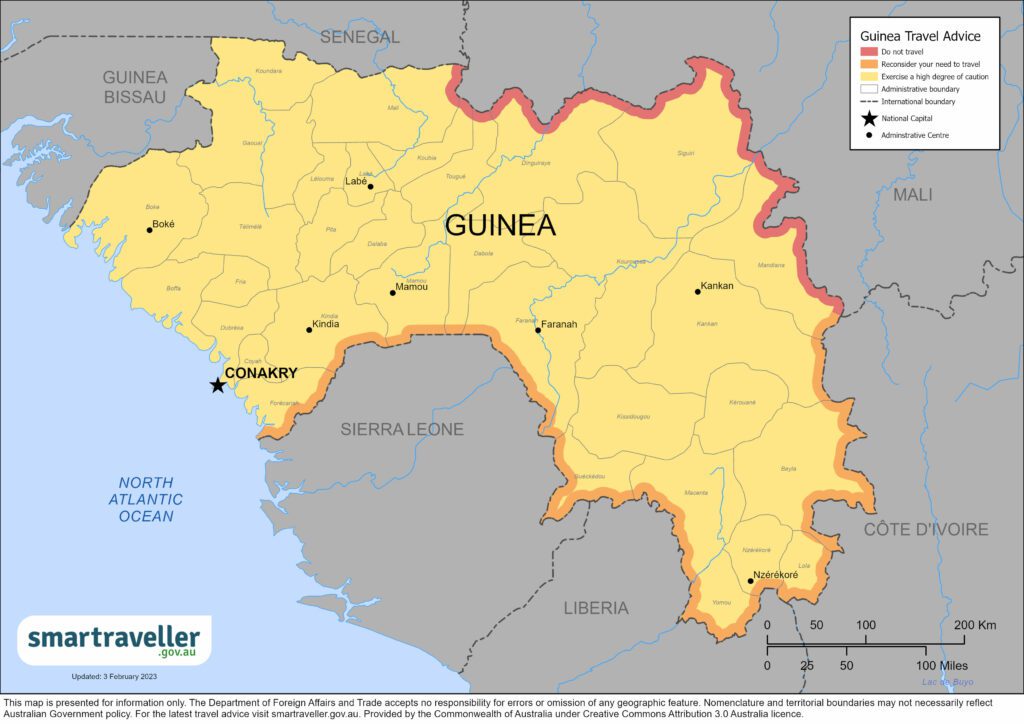Violent crime
Violent crime happens in Conakry and other parts of Guinea. This includes:
The risk of violent incidences can happen anytime but increases after dark. Crimes may be perpetrated by persons wearing military or police uniforms who are armed.
Foreigners are often the target of crime, especially at the airport.
Petty crime
Petty crime, such as pickpocketing and purse-snatching, occurs at the airport, in markets, taxis or communal transport, and near popular hotels and restaurants. These crimes are often perpetrated by children.
Frequent power outages may worsen security conditions, especially in large urban centres. This often leads to more crime, especially if street and traffic lights fail.
To protect yourself from violent and petty crime:
be vigilant while driving in Conakry and surrounding areas, especially when travelling to and from Conakry International Airport
drive with doors locked and windows rolled up at all the time, even when moving
exercise caution at the airports. Arrange to arrive during the day and be met by reliable contacts
keep your passport and valuables in a secure place
don’t wear expensive-looking jewellery or watches and keep mobiles out of sight
ensure your accommodation is secure and has security guards
stay alert after dark or if there’s a power failure
don’t walk alone at night
Scams and fraud
There have been reports of police extorting cash from foreigners and Guineans.
There are reports of trading scams involving diamonds, gold export and gold certification. This trade attracts criminal gangs and can involve kidnapping and extortion.
Internet scams may come in the form of romance, friendship, business and employment opportunities. These scams often originate in West African countries.
If you travel to West Africa as a scam victim, you are at risk of:
This includes travelling to meet a friend or love interest, as well as trying to get your money back or get revenge.
Commercial and relationship scams are common fraud schemes.
In commercial scams, criminals ask for details of safe bank accounts to transfer large amounts of money. They may also:
promise a percentage of this amount to you
send fake cashier cheques for urgent goods shipments
request large fees for a fake government contract
extort money from you for a bogus business opportunity
In relationship scams, criminals often meet their victims through internet dating sites or chat rooms. Once they have formed a connection, they may:
ask you to send money so they can come to Australia
ask you to come to Africa to meet them
Once you transfer money, the relationship often ends. If you travel to Guinea to meet the criminals, you may be in danger.
To protect yourself from scams:
be wary of online contact from people you don’t know
don’t send money to anyone until you’ve thoroughly checked them
If you suspect a scam, get legal advice.
Don’t travel to Guinea to get your money back or to get revenge. You could be in danger.
Pirates
Piracy and armed robbery has been reported in the coastal waters.
The International Maritime Bureau issues piracy reports.
Cyber security
You may be at risk of cyber-based threats during overseas travel to any country. Digital identity theft is a growing concern. Your devices and personal data can be compromised, especially if you’re connecting to Wi-Fi, using or connecting to shared or public computers, or to Bluetooth.
Social media can also be risky in destinations where there are social or political tensions, or laws that may seem unreasonable by Australian standards. Travellers have been arrested for things they have said on social media. Don’t comment on local or political events on your social media.
More information:
Source link : https://www.smartraveller.gov.au/destinations/africa/guinea
Author :
Publish date : 2024-04-19 07:00:00
Copyright for syndicated content belongs to the linked Source.
